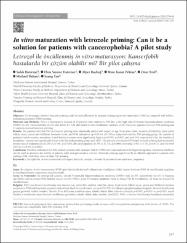In vitro maturation with letrozole priming: Can it be a solution for patients with cancerophobia? A pilot study

Göster/
Erişim
info:eu-repo/semantics/openAccessTarih
2020Yazar
Hatırnaz, ŞafakSaynur Hatırnaz, Ebru
Başbuğ, Alper
Kanat Pektaş, Mine
Erol, Onur
Dahan, Micheal H
Tan, Seang
Üst veri
Tüm öğe kaydını gösterKünye
Hatırnaz, Ş., Hatırnaz, E. S., Başbuğ, A., Pektaş, M. K., Erol, O., Dahan, M., & Tan, S. (2020). In vitro maturation with letrozole priming: Can it be a solution for patients with cancerophobia? A pilot study. Turkish Journal of Obstetrics and Gynecology, 17(4), 247.Özet
Objective: To investigate whether letrozole priming could be used efficiently in patients undergoing in vitro maturation (IVM) as compared with follicle-stimulating hormone (FSH) priming. Materials and Methods: This is a retrospective analysis of 63 patients who underwent IVM due to the high risk of Ovarian Hyperstimulation syndrome (OHSS) (n=39), cancerophobia (n=16), and desire for IVM after failed in vitro fertilization attempts (n=8). Forty-two patients received FSH priming and 21 patients received letrozole priming. Results: The patients who had FSH or letrozole priming were statistically similar with respect to age, body mass index, duration of infertility, basal antral follicle count, serum anti-Müllerian hormone levels, and IVM indications (p>0.05 for all). When compared with the FSH priming group, the number of germinal vesicle oocytes, metaphase II and fertilized oocytes were significantly higher (p=0.003, p=0.001, and p=0.016, respectively), but the number of metaphase I oocytes was significantly lower in the letrozole priming group (p=0.002). The patients who received FSH and letrozole priming had statistically similar rates of implantation (33.3% vs 37.0%, p=0.709), clinical pregnancy (31.5% vs 33.3%, p=0.848), twinning (1.9% vs 3.7%, p=0.611), and live birth (24.1% vs 29.6%, p=0.682). Conclusion: Potential indications for IVM include patients with increased risk for OHSS and contraindication for hyperestrogenism. Aromatase inhibitors can be used to preserve the fertility of patients with estrogen-sensitive cancers. Letrozole priming appears to be an efficient approach in patients who undergo IVM, with likely less cost than FSH priming.















